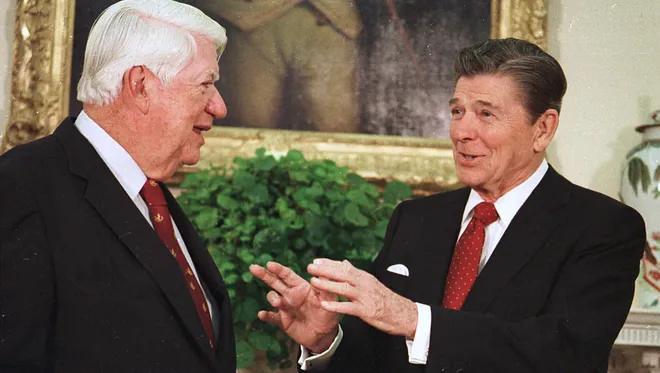The way politicians engage with each other has changed over the years. Many people remember the image of President Ronald Reagan and Speaker of the House Tip O’Neill. Despite their differences, they showed respect for one another. They disagreed often, but their relationship was based on understanding.
Today, civil discourse is rare in politics. Instead of listening to one another, many leaders focus on name-calling and vilifying their opponents. This shift has hurt public conversation, leaving citizens with less trust in those who hold different views.
The Impact of Political Rhetoric
As citizens, we often follow the examples set by our leaders. We argue, cancel, or unfriend others who have opposing views. We’ve been taught not to talk about politics or religion, leading to a lack of practice in discussing difficult topics respectfully.
This has created a divided society where people struggle to find common ground. We cannot agree on how to solve critical problems. This makes it harder to build trust in the systems that keep us safe, healthy, and prosperous.
The Texas Lyceum’s Campaign for Civility
In Texas, a group of young business and community leaders started the Texas Lyceum 45 years ago to bring people together. They wanted to tackle the state’s challenges in a nonpartisan, respectful way. Today, the Lyceum is still active, bringing together Texans from all political backgrounds, identities, and sectors.
Earlier this year, the Texas Lyceum launched the Campaign for Civility, calling on leaders to adopt values that strengthen democracy. These values encourage people to engage in civil discourse, seek understanding before being understood, and disagree without being disagreeable.
The Need for Respectful Dialogue
The latest Texas Lyceum Poll reveals that Texans are ready for change. The survey showed:
- 69% of Texans believe it is possible to disagree about politics respectfully.
- 42% of respondents think elected officials are most responsible for the divisions among Americans.
This survey highlights the need for politicians to model respectful engagement. As leaders in their communities, they have the power to set the tone for the entire nation.
Tactics for Building a Culture of Civility
The Texas Lyceum’s Campaign for Civility encourages all Texans to engage in better conversations. Here are some steps that can help foster respect in political dialogue:
- Connect with people across the political spectrum: Engage with those who have different views. Find common ground on the issues that matter most to you.
- Focus on shared values: Most people, regardless of party, agree on many core values. Acknowledging these commonalities can lead to better understanding.
- Look for points of agreement: When you disagree, start by recognizing areas where you can agree. This builds trust and keeps conversations respectful.
- Diversify your media sources: Listen to a variety of viewpoints by consuming news from both sides of the political spectrum. This helps you understand other perspectives.
The Importance of Civility in Politics
It’s crucial to remember that political opponents are not enemies. Healthy political debate requires diverse perspectives, but how we argue matters just as much as what we argue. Relationships must always go beyond politics. When we care more about the person than their political views, we can engage more meaningfully.
Moving Forward Together
Now is the time for a renewed commitment to civility, respect, and understanding. By following the values outlined in the Campaign for Civility, we can work together to move our country forward. It’s not just about politics — it’s about building a culture of respect that helps our communities thrive.







